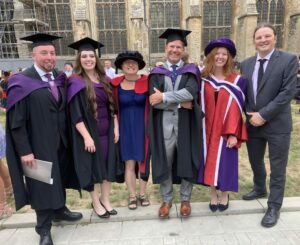How Steve Backshall came to achieve an MSc with Venomtech and Canterbury Christ Church University

From spending a year in Japan and obtaining a black belt in judo, to drinking blood with previously uncontacted Indonesian tribes, getting caught in crossfire in East Timor, and winding up in a Columbian jail cell, it’s safe to say that Steve Backshall has led a colourful life. It’s no wonder that he was snapped up very quickly by National Geographic as its ‘Adventurer in Residence’. This marked the start of a successful career in producing, filming and presenting a large degree of different adventure and natural history television content – swiftly becoming an inspiration to generations of budding naturalists.
Steve has always been dedicated to continual higher education, beyond a very niche personal journey and professional career path. With an undergraduate degree from Exeter University in English and theatre studies, another from the Open University in biology, and a further diploma in natural sciences, the next goal was to complete an MSc, and this is where Venomtech came in!
A chance connection
Steve’s Venomtech journey began after he posted an article on social media about the common misconceptions of false widow spiders. Venomtech liked and replied with “Nice article, we often get questions about these arachnids and their venom”, with no further expectations beyond, perhaps, a ‘like’.
To our surprise, Steve reached out to us, asking whether we could analyse small amounts of venom. Further enquiries revealed that Steve had access to a very novel amphibian venom that he wanted to know more about. This initiated a six-year-long relationship with Venomtech, where he furthered his deep interest in venoms and their therapeutic applications. This led to Steve’s decision to study for an MSc at Canterbury Christchurch University, taking advantage of its close ties with Venomtech. By completing his practical research work out of our world-leading laboratory spaces and those of CCCU also at Discovery Park. This allowed him to benefit from the unique academic guidance and specialist practical expertise we offer.
We quickly realised that our initial collaborative investigation into his unique amphibian venom sample could provide a strong topic for a distinctive thesis. Detailed analysis showed that he had characterised a completely new venom system that contained many different components with numerous potential therapeutic applications. These prospective benefits became the focus of Steve’s MSc, as he explored the venom’s effects on cancer cells, as well as its antibiotic potential.
Steve Backshall had this to say about working with us “I’d heard of Venomtech from scientist friends in Australia, who clearly regarded them as world leaders in their field. When I first met them, the scale of their ambition, knowledge and potential was overwhelming. That they have given me the opportunity to work alongside them, and learn from their phenomenal passion, is one of the great privileges of my life. I’ve been working in science for 20 years, but feel like my real science journey did not begin until I met my friends at Venomtech. Venom is a complex mixture of molecules that have evolved over deep time to target such specific elements of biology, their potential as medicines, pesticides and potential cure for diseases like cancer, surely makes this the most exciting expanding field of pharmacology and Venomtech are right at the cutting edge. This is a company staffed with people who are not just the very finest scientists in their field, but are excited by and powered on by the powerful idea of what natural toxins can achieve. I’ve never felt so carried away on a wave of enthusiasm and excitement, and the only reason I have completed my master studies is because of Steve Trim and his team.”

A bright future
Steve Backshall’s is one of many such successful collaborations, and we have plans to jointly publish an academic paper on this work and its applications later this year. Even more excitingly, Steve now joins the ever-expanding list of students taken under our wing with Dr Carol Trim of Canterbury Christ Church University (CCCU) to help them obtain their postgraduate degrees. Steve Backshall graduated from CCCU at Canterbury Cathedral on the 6th of September 2022, with fellow MSc’s from our collaboration Alice Upton (Canine cancer biology), Phil Robinson (Cnidarian venom systems), Summer Tredgett (Scorpion venom antimicrobials) and our PhD Emily Knight (Pancreatic cancer). Of course, Steve Trim and Danielle McCullough from Venomtech were on hand to congratulate them, and the CCCU academics in the post-ceremony celebrations. We simply can’t wait to see what extraordinary things he will go on to do next.
